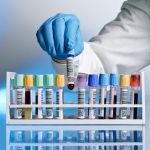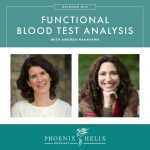“Knowledge is proud that he has learn’d so much.
Wisdom is humble that he knows no more.”
~ William Cowper
The Price vs. the True Cost
For $229, you can get your genome sequenced by 23andMe, and for just a little more money, you can get it computer-analyzed. The question is – when is this a good idea, and when is ignorance bliss?
What is Genetic Testing and How Does it Work?
DNA is present in every cell in our body, and it contains our unique genetic code. In addition to determining eye and hair color, it also contains information related to our health and where we might be vulnerable to disease. Genetic testing reads DNA with this in mind. It searches for SNPs, which are genetic mutations. That’s a scary-sounding word, but every human being has SNPs and most of them are benign. If you have a SNP associated with disease, that doesn’t necessarily mean you’ll get that disease. In fact, healthy people have an average of 400 mutations for illnesses they don’t have. This is important. There’s a field of science called Epigenetics, which studies the environmental factors that cause our genes to be turned on and off. In fact, this is happening constantly in our body every day. That’s the power of the paleo diet and lifestyle. When we eat healthy foods, spend time outdoors, prioritize sleep, manage our stress, and make time for joy, we turn off hundreds of inflammatory genes. Since inflammation is at the root of almost every disease, that’s a powerful effect. When we do the opposite – eat junk food, burn the candle at both ends, and dwell in negativity, we turn those same genes back on again. So while this article is delving into the information we can learn through genetic testing, remember that whatever your results, you can influence your personal outcome.
The Pros of Genetic Testing
Sometimes knowledge is power, and you can make better decisions for your health based on that knowledge. Here are some examples:
- Learning your methylation capacity. MTHFR sounds like a swear doesn’t it? It refers to genetic mutations in our methylation pathways, which can impact cellular function bodywide. There is a strong correlation between this mutation and autoimmune disease. For example, if you learn that you have a double mutation (homozygous +/+) in the C677T gene, that reduces your methylation capacity by approximately 70%. You might still be managing fine at that level or it might be a roadblock to healing. You can work with a practitioner to find out.
- Medication tendencies. Genetic testing can also provide information on your predicted response to certain medications – whether they will or will not work for you. That can be helpful information for your doctor to have.
- Understanding your illness. When you see the genetic links to your autoimmune diagnosis, it can help explain why you developed that particular illness and take away some of the blame you might feel for your pre-diagnosis choices. While we aren’t completely defined by our genes, we are influenced by them. If we have a high level of genetic risk for a disease it’s much harder to prevent altogether than if we have just one or two mild mutations associated with it. However, even when we can’t avoid a disease, we can often affect its severity. Always remember the power of epigenetics.
- Information can be lead to prevention. If you discover that you are at high risk for diseases that you don’t have, you might take steps in terms of testing to monitor that part of your health more closely. It also encourages you to continue doing everything you can to work the epigenetic factors in your favor.
- Seeing the good news. It’s also nice to see the positive genetic cards you’ve been dealt. Chronic illness can sometimes feel all-consuming and all we see is what’s wrong. Seeing all of your positive and protective genes in your DNA provides some balance to your self-view.
- Fun information. Lastly, genetic testing includes some fun and quirky information – everything from your percentage of Neanderthal genes, to genes for optimism, to whether or not you’re easy to hypnotize.
The Cons of Genetic Testing
It can be overwhelming. When you see all of your genetic mutations and vulnerabilities listed out in a report, it can make you feel like a “hot mess”. You can make the mistake of thinking you will get every illness listed, and that type of negative thought spiral is unhealthy – even inflammatory as I mentioned earlier in this article. Only order genetic testing if you know you can read that information from an objective, grounded and peaceful place. If you are prone to worry and anxiety, this type of testing probably isn’t a good choice for you.
Another concern is privacy. The Genetic Information Nondiscrimination Act (GINA) prevents employers and health insurance companies from discriminating based on genetic tests. However, there are loopholes for other types of insurance carriers such as disability insurance, life insurance or long-term care insurance. All of them can reject you based on genetic tests. In addition, when you undergo this type of testing, it’s stored online. And while 23andme gives you privacy choices regarding how that information will be shared with others, any information online can be hacked.
Prioritizing where you spend your testing dollars. While genetic testing is interesting, we cannot change our genes. So, when it comes to troubleshooting our health, there are other tests that can be more beneficial, by showing imbalances in our body that we can change. This doesn’t mean you should never order DNA testing; but I don’t recommend it as the first test you choose. You can find the tests that give you the best bang for your wellness buck in this article: How to Find a Good Functional Medicine Practitioner.
Your DNA Testing How-To Guide
If you’ve considered all of the pros and cons and decided you want to get your DNA tested, here are the steps:
- Choose a testing company. 23andMe is the most common choice, because it’s a pretty detailed DNA profile at a very low cost. However, there are certain conditions that it doesn’t test for, such as Huntington’s disease and Fragile X syndrome. Those are independent medical tests which are best ordered through a doctor’s office.
- Fill out and mail your kit. 23andMe will send you a saliva collection tube along with instructions. Mail the filled kit back to them, and you’ll receive your report within 6-8 weeks, which you will then access online.
- Results phase one. When you login to 23andme, you’ll have access to your complete unanalyzed results (a list of all of your genes and their SNPs). You’ll find this “Raw Data” under the Tools tab, where you can download it to your computer. After that, 23andMe only provides very simple reports due to restrictions the FDA has placed on the company. The reports available include: (1) An ancestry report which not only tells how much European, African, Asian, Native American and Middle Eastern genes you have, but also your Neanderthal genes. (2) A traits report that explains why you have dimples or blue eyes or sneeze in bright sunlight. (3) Some wellness reports that are so basic they aren’t really helpful. (4) Carrier status reports that will let you know if you might pass a gene for certain health problems onto your children. (5) Some limited genetic risk reports.
- Results phase two. Promethease offers a more detailed computer analysis of your 23andme results for only $12. The most helpful report is labeled “report_ui2”. It lets you filter your DNA results for specific medical conditions and brings up a pie chart that shows you how many genes protect you vs. how many make you vulnerable. It also includes information about magnitude (how high the risk for each mutation) and frequency (how common the mutation in the general population). It’s a lot of information, and you can spend many hours exploring and learning.
- MTHFR analysis. Earlier in the article, I mentioned how this can be helpful genetic information to have for anyone with autoimmune disease. In Promethease you can search the word “Methylation” for a quick summary of the genes that apply to you. However, there are websites dedicated to MTHFR gene analysis specifically.
- Genetic Counseling. We now have access to our genetic data without having any education in how to accurately interpret that data. A little knowledge can be a dangerous thing. If your results concern or confuse you, it would be wise to have your report interpreted by someone who is an expert in the field. This would be a genetic counselor. You can find one through The National Society of Genetic Counselors.
My Personal Experience
I avoided getting tested for years, because I didn’t want to obsess over my genetic inheritance. My father has dementia. I’ve already had one large genetic vulnerability manifest (rheumatoid arthritis). I didn’t want to worry I would manifest more. But I believe in epigenetics and have felt its power in my own life. So, when I was no longer afraid, I ordered my DNA test. I discovered that I do indeed have some of the genes associated with Alzheimer’s – not the worst profile, but not the best one either. However, research is showing that diet and lifestyle can have an impact, and I feel empowered by my current choices. My test also revealed some of the HLA autoimmune genes (no surprise). It was interesting to see that I had the potential for a variety of diagnoses – everything from Crohn’s to lupus to diabetes. This is likely why many people develop more than one autoimmune disease, but RA was my biggest vulnerability, so it explained why that was the switch that got flipped in my body.
I also found that I had genetic mutations for many illnesses that I don’t have. This is true for everyone! Rather than being frightened by this information, I felt reassured. We are more than our DNA. The healthier I live my life, the best chance I have of making the most of the genetic cards I’ve been dealt. Also, genetic information is often contradictory. One gene puts you at risk and another gene protects you from the same illness. Human beings are complex. Don’t stress over every gene. For example, there are 51 genes associated with rheumatoid arthritis (not just one).
There was also some fun information I found out about myself:
- I have a gene that’s known for optimism, empathy, the ability to handle stress well, and the ability to read body language. I can’t count the number of times my husband and I have been in a group gathering, and I can easily see who is in the middle of a fight, who is flirting, who is nervous, who is tired, and my husband remains blissfully unaware of it all.
- I have the “picky eater” gene that correlates to children who don’t like to eat vegetables, but whose taste buds change when they become adults. This totally happened for me! I love vegetables now, with one caveat – I’m still not a fan of Brussels sprouts.
- I have more Neanderthal genes than the average person. It’s therefore no surprise that the paleo diet and lifestyle appeal to me!
Final Advice
DNA testing isn’t required for your health. It’s an optional choice, and only you know if it’s a good one for you. If you choose to be tested, realize that it’s just one piece of your personal healing puzzle. Don’t make medical decisions based on DNA reports alone. No matter what you decide, make the best choices every day in terms of diet and lifestyle. Use the power of epigenetics to express your optimal genetic potential.
You May Also Be Interested In
A version of this post originally appeared in my column in Paleo Magazine.
Credit: image at top of page from Christoph Bock via Wikimedia Commons.










Hi Eileen, Color Genomics is a relatively inexpensive way to get testing done for breast cancer gene and other potentially cancer-causing genes. University of Washington and other cancer centers have a partnership with Color to get testing for patients whose insurance may not cover genetic cancer testing, yet need it. It’s $249, but $199 during October (breast cancer awareness month). https://getcolor.com
Thanks for sharing, Mary!
I purchased the 23 and me testing upon the recommendation of a new functional med doc and found it to be the biggest waste of mo way unless I am doing something wrong. Even more frustrating, after spending money and time on this test the doc said she agreed and made a mistake in her recommendations????? This test only covers maternal side not both and tested for the most remote and unlikely diseases. My complaint is pretty much in line with many others!! I learned nothing new or helpful pertaining to every day concerns. Ie..auto immune, diabetes, cardio vascular, neurological, etc. I was however reminded that my eyes are blue , I have fair skin and no dimples!!?? I was thinking of taking the raw sna from this test to someone who could possibly Break it down but again, it’s one sided so not the best representation of me as a whole at all! I found this test a complete waste and while I typically value your well researched and educated opinions..I find this one incorrect!!
Marybeth, did you run your results through Promethease? There is so much information in that data. I totally agree that the 23andme reports are a waste of time, but when I ran the results through Promethease, I found MTHFR information, autoimmune vulnerabilities, risk levels for other common health problems, my APOE genes (related to Alzheimers risk), medication tendencies and so much more. It was definitely not a waste of my money. Also, you are mistaken that you only received partial results. 23andme tests autosomal DNA, which you inherit from both parents. Where the confusion comes in is where 23andme also tests dna specifically from the x & y chromosomes to gather ancestry line information. You and I don’t have y chromosomes, so that obviously can’t be tested. But this doesn’t affect the medical application of the results. I understand it’s confusing. Here’s an article from 23andme: Do men and women receive different information?
Getting my DNA tested was critical for me to move forward in recovering my health. I was stalled. Some improvement but far from healthy. Diets, exercise, sleep, detox, you name it. I have Chronic Lyme. Without the DNA testing and learning that I have some MTHFR variants that require different supplements, I would not have progressed to where I am able to work. It was, for me, the best thing I could have done. I’m still going back and using that data. Having had a lifelong problem with muscle cramping, I found a Genetic Genie article that identified a specific SNP associated with that and sure enough, I have the allels that predispose me to problems. With that knowledge, I can modify my diet and supplements to facilitate my body’s ability to make acetylcholine, which apparently was the root of the problem. I’ve slept through the night with no issues for three weeks now. Being tested, learning and understanding, applying (with the assistance of my doctor) the knowledge I have acquired has made a huge difference in the quality of my life and my ability to live. I am most grateful.
Karen,
Glad to hear your good news. My husband and I are awaiting our 23andme results right now. We also gifted kits to our children and their spouses. I feel like the more informed we are the better choices we can make in the future for our own health and theirs.
We already know of some genetics abnormalities, and hope to gather more information to allow us all the live healthier longer.
Wishing you and your family abundant health and happiness, Debbie!
That’s so empowering, Karen. Thanks for sharing your experience.